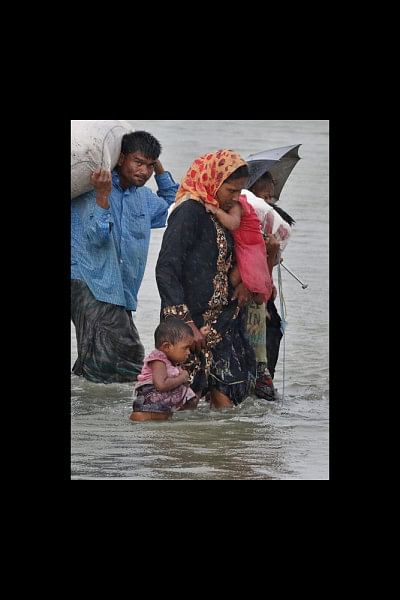Can Rohingyas return to their homeland?

On September 28, the UN Secretary General Antonio Guterres briefed members of the Security Council in an open session on the ongoing violence in Rakhine which had forced 500,000 Rohingyas to take refuge in Bangladesh. The meeting was held at the request of 7 members of the Security Council. No statement was issued by the President of the Council—currently held by Ethiopia.
At the briefing, Secretary General Guterres said that "the situation has spiralled into the world's fastest developing refugee emergency, a humanitarian and human rights nightmare…We have received bone-chilling accounts from those who fled." Testimonies pointed to serious human rights violations, noted Guterres. "This is unacceptable and must end immediately," demanded the Secretary General.
Myanmar's representative U Thaung Tun, echoing Aung San Suu Kyi, denied all allegations of ethnic cleansing and genocide. Bangladesh's Ambassador Masud Bin Momen reflected on Prime Minister Sheikh Hasina's plan, calling for the creation of safe zones inside Myanmar and repatriation of the displaced Rohingyas. US Ambassador Nikki Haley said, "We must consider action against Burmese security forces who are implicated in abuses and stoking hatred." US, Britain and France, all permanent members, were joined by other members demanding immediate end to the ongoing violence and a strong UNSC response. Japan condemned the attacks on civilians. But Chinese deputy Ambassador Wu Haitao said that the situation in Rakhine was stabilising and that all parties should work constructively. Russian Ambassador Vassily Nebenzia warned that "excessive pressure" on Myanmar's government "could only aggravate the situation in the country and around it." China and Russia, both permanent members, were against issuing any statement.
Bangladesh wanted a consensus leading to a strong statement from the UNSC calling upon the Myanmar authorities to stop the ethnic cleansing and create a situation that would facilitate the return of the Rohingyas from Bangladesh. With the current inflow of over 500,000 Rohingyas, the total number of Rohingya refugee presently living in Bangladesh is now nearly one million—an untenable economic burden on Bangladesh. Clearly, the permanent members were divided—a serious setback for Bangladesh.
The crux of the crisis lies in the Myanmar authorities' refusal to grant citizenship to the Rojhingyas and the systematic discrimination against them that has continued since the promulgation of the 1982 Citizenship Law. The narrative that follows is all too familiar for repetition.
The Annan report also mentioned the citizenship issue very cursorily. There are serious lacunae in the recommendations—it does not use the term "Rohingya" but "Muslims of Rakhine"; it does not call upon Myanmar to restore citizenship and basic rights of the Rohingyas, but only calls on the Myanmar government to quicken the verification process and revisit (not change) the 1982 Citizenship Law.
Suu Kyi in her speech to the Myanmar parliament on September 19 mentioned that all Rohingyas (she did not use the term) would be able to return after a process of verification. This is a clear trap; as the verification process would drag on for years, if not decades. Primarily because the majority of Rohingyas do not possess any document issued by the Myanmar authorities. It would be a herculean task for international organisations—IOM, OCHA, UNHCR, etc—to prove that these are displaced Rohingyas, who fled Rakhine following brutal persecution.
The Annan report is clearly a tailored document that fits in with the Rohingya expulsion plan of the Myanmar junta. The Commission was set up by Suu Kyi, presumably at the junta's advice, to deflect world opinion. It neither had any international mandate nor was Bangladesh involved in setting it up.
The junta has been planning for decades to change the demographic composition of Rakhine. It had planned to expel the Rohingya Muslims and Hindus from Rakhine and establish Buddhist majority in the state. That policy led to repeated violence against the Rohingyas since 1978 and forced these people to repeatedly take refuge in Bangladesh.
After the current spate of ethnic cleansing, the junta is determined not to allow the displaced Rohingyas to return to Myanmar. The junta's policy towards Rohingyas was made abundantly clear by Myanmar's Army Chief General Min Aung Hlaing when he said, "They have demanded recognition as Rohingyas, which has never been an ethnic group in Myanmar." The Myanmar military has planted landmines along the border with Bangladesh. According to reports, it has mobilised 70 battalions of troops with heavy artillery and equipment to crush ARSA insurgency and thwart the Rohingyas from returning to Rakhine.
Referring to the process of repatriation of Rohingyas, Guterres said that the 1993 Joint Statement by the Foreign Ministers of Bangladesh and Myanmar was not sufficient in the present circumstances. "The Muslims of Rakhine state should be granted nationality" the Secretary General insisted. If Suu Kyi's offer for the verification process is taken along with the Annan recommendations, only a handful of Rohingyas will be able to go back to Myanmar—much less than those of 1978 and 1993. General Hlaing, it seems, will certainly not agree to take back all the Rohingyas.
The Rohingya issue is an internal issue for Myanmar; but has become an international issue because of the exodus of Rohingyas into Bangladesh. Therefore, Bangladesh must keep the UN Security Council fully involved in the repatriation of these people and in resolving the problem permanently. It would be a folly if Bangladesh tries to resolve this problem bilaterally with Myanmar.
Bangladesh has to convince China and Russia and get the UNSC to adopt a binding resolution with the following included: i) impose economic sanctions on Myanmar, for as long as this crisis is not permanently resolved; ii) repatriation of all Rohingyas within a fixed timeframe, under UN supervision; and, iii) grant full citizenship to all Rohingyas with their human rights fully recognised.
Unless the UNSC comes forward with a stringent resolution under Chapter VII of its Charter, it appears that Bangladesh is doomed to host these hapless Rohingyas for a long time.
Mahmood Hasan is former ambassador and secretary.





Comments